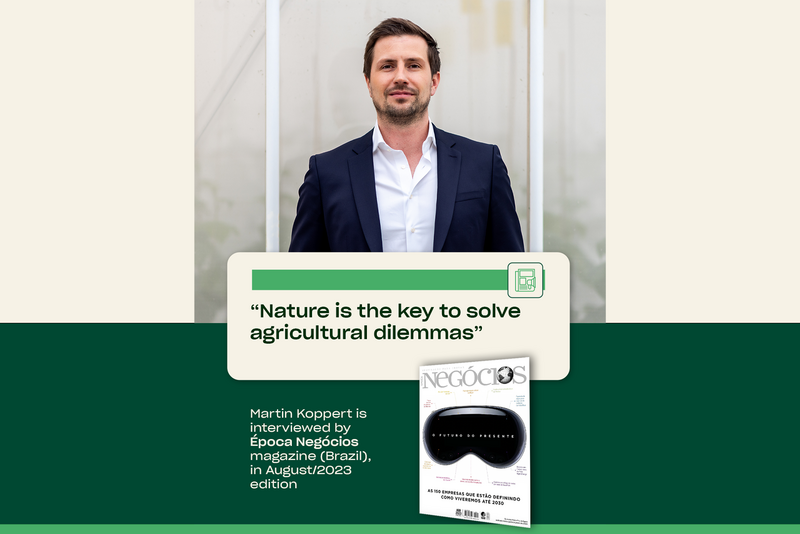
Source: Época NEGÓCIOS
Martin Koppert, Chief Business Officer rand grandson of the founder of the agricultural biocontrol giant Koppert, shares the company’s plan for Brazil.
In the late 1960s, when the way of cultivating food worldwide was vastly different to what it is today, Dutch farmer Jan Koppert was seeking a natural solution to recurring pests in his cucumber cultivation. The usual pesticides were no longer effective, but the results achieved with the use of natural enemies were promising.
With the support of his son Peter Koppert, Jan founded Koppert in 1967.
Today, it is known as a giant biological crop protection company worldwide, always using nature to restore the delicate balance that has been disrupted. ‘Our vision is that the world needs 100% sustainable agriculture,’ says Martin Koppert, Chief Business Officer and board member of the Dutch multinational in an interview with Época NEGÓCIOS.
The company has been present in Brazil since 2011, with three production units focused on research and development. This investment places Koppert at the forefront of industry innovation, fifty years after the initial technology was developed. ‘Our global R&D teams work continuously to enhance the effectiveness of existing solutions and to discover new ones. Remedies, increasingly preventative, with a focus on plant health and crop resilience,’ states Martin Koppert.
While investment in research and development keeps the company ahead, Brazil plays a strategic role in this scenario. Here, the company invests in high-level scientific research in partnership with universities. Recently, it inaugurated the country's first innovation hub for biological control technology also known as the Gazebo, backed by a fund of 50-million Brazilian Reais.
How are new technologies transforming the market of pesticides and, consequently, food production?
Martin Koppert: Today, there is a series of challenges that demand our attention. An urgent issue is the alarming loss of biodiversity, with significant implications for the health of our planet. Furthermore, the use of pesticides has rendered pests and diseases more resistant, sparking concerns about food safety and quality. As a result, there is a growing consumer demand for healthier foods with reduced chemical content.
As the use of chemical pesticides becomes more restricted, there is an increasing need for sustainable alternatives. This restriction highlights the urgency of finding sustainable technologies that are environmentally friendly while ensuring crop security.
A growing need for viable alternatives
Our R&D teams work to enhance the effectiveness of existing solutions and to discover new ones. The majority of them are still curative solutions. But increasingly, we invest in prevention, with a focus on plant health and crop resilience.
To confront these challenges, it's crucial to adopt cultivation practices that are both safe and environmentally responsible.
What is the main global challenge in achieving 100% sustainable agriculture?
At the heart of our approach lies the belief that nature holds the solutions to these challenges. That’s why we decided to partner with nature, aiming to restore the delicate balance that had been disrupted. Driven by innovation, we provide an integrated system of specialized knowledge and natural solutions that enhance the resilience of crops. Bovenkant formulier
In Brazil, we work with our concept of an integrated system: a comprehensive portfolio including both macro and microorganisms for large open-field crops. The company collaborates with Sparcbio (São Paulo Advanced Research Center for Biological Control), a unique centre in the country, that involves collaboration between our company, the University of São Paulo through ESALQ (Luiz de Queiroz College of Agriculture), and Fapesp (São Paulo Research Foundation). Together, we engage in high-level scientific research to develop sustainable agricultural technologies.
The goal of the centre is to establish innovative methods for pest control, with a new management model that inspires continuous innovation in pest and disease control for tropical agriculture, over the course of five decades. Developing research projects, beneficial insects, macro-products, and resulting biological technologies are part of our efforts to strengthen this type of management.
Beneficial insects and biological solutions have been integral to our family-owned company since 1967, and we aim to further expand the Brazilian ecosystem of innovation. We have recently launched the Fundo Gazebo with the purpose of research and development, to introduce new types of biological solutions, such as biofungicides and bacteria-based solutions. We follow the same strategy in other countries across the Americas, cooperating with our clients and working with a sustainable approach to manage ecosystems. Our products and knowledge are utilized by growers around the world to restore the natural balance of productive systems.